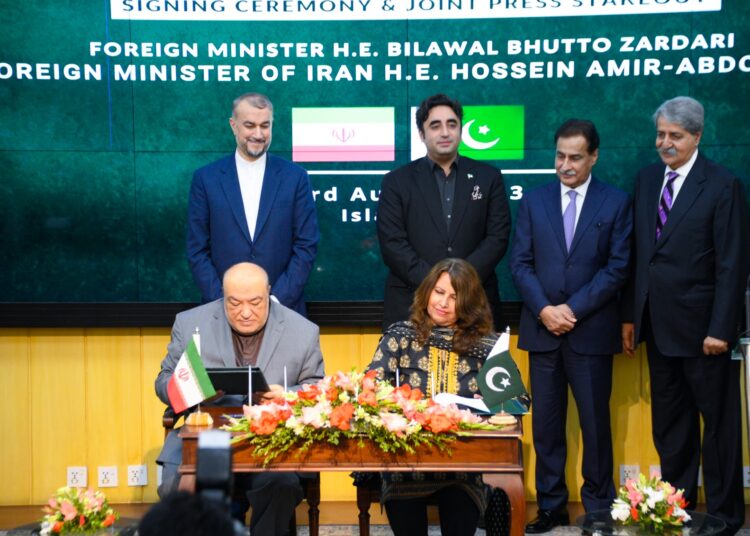Iran and Pakistan’s nexus of bilateral ties could be profoundly cemented by an intertwined commerce, which could serve as the cohesive binder of the relationship between Tehran and Islamabad.
Marking the culmination of the negotiations between the foreign ministers of both countries, a series of economic agreements were signed on Thursday, August 3, in Islamabad, fostering deeper collaboration. The repertoire notably includes a five-year strategic plan for trade cooperation (2023-2028), proceedings from the third meeting of Iran and Pakistan’s joint investment committee, and a protocol outlining economic and commercial cooperation. On a further note of significance, Iran’s Foreign Minister, Hossein Amirabdollahian, iterated Tehran’s unequivocal readiness towards the successful execution of the Iran-Pakistan (IP) gas pipeline project, also known as Peace Pipeline. The confluence of Iran-Pakistan economies, according to some experts, narrates a tale of symbiotic complementarity, potentially elevating Tehran-Islamabad relationship to strategic proportions stimulated by enhanced commercial interplay.
Emerging spheres of economic cooperation
A cursory glance at basic economic principles unveils a landscape of considerable commercial and geopolitical synergies between Iran and Pakistan. Not just confined to the energy sphere, but Iranian commercial goods and industry possess the potential to satisfy numerous Pakistani necessities. Reciprocally, Pakistan possesses a viable platform to sharpen its geo-economic positioning by harboring connections between Iran and South Asia, thanks to its geographically proximate location. It can also meet certain commercial requisites of Iran.
Observing Pakistan, noted as an import-oriented country, uncovers vast opportunities for Iranian commodities, spanning consumer, intermediate, raw material goods and extending to petroleum-based and non-petroleum goods subject to price and quality compatibilities. Simultaneously, Pakistani businessmen can leverage their position as intermediaries for the sanctioned and essential imports desired by Iran.
The commercial connections between Iran and Pakistan possess significant scope for expansion, both at the macro and micro levels. This was recently highlighted during the Iranian President, Ebrahim Raisi’s visit to Sistan and Baluchistan, where the first-ever joint border market between the two countries, at the “Pishin-Mand” border, was commissioned to function in the presence of the Pakistani Prime Minister, Shehbaz Sharif. Anchoring this precedent, future plans aim to inaugurate six additional border bazaars to amplify border trade and catalyze local commercial exchanges.
Concurrently, Pakistan’s energy resource scarcity, coupled with its geographical immediacy to Iran, fortuitously permits Pakistan to source its energy, primarily electricity and gas, from Iran, leveraging the low costs and available infrastructure. As per previously-signed accords permitting electricity trade on 132 kV lines between the neighbors, the trading quantum is set to rise by 100 megawatts, rounding up to 200 megawatts. Moreover, on the advent of the second phase and the construction of a 70-kilometer-long 230 kV line located within Pakistan, the power exchange capacity promises to rise substantially, nearly doubling to 400 megawatts.
Navigating through trade barrier constellations
In the Pakistani marketplace, prominent economic contenders such as China and Turkey present Iran with stiff competition. However, a perceivable lack of zeal to cultivate trade relations has posed a greater impediment in nurturing economic conductivity between these two nations. Nevertheless, the recent signing of economic agreements during the Iranian Foreign Minister’s visit to Pakistan might alleviate some of these hurdles and expedite their implementation.
Though Iran and Pakistan have in place a preferential trade agreement, tariff roadblocks persist in their path, repeatedly prompting the suspension of this agreement and stunting the broadening of trade links between the countries. Official figures illustrate an enigmatic disparity: unofficial transactions, including those involving smuggling, between Iran and Pakistan significantly outnumber their formal counterparts. Notably, a substantial percentage of smuggled commodities from Iran to Pakistan encompasses fuel.
Simultaneously, the India-Pakistan rivalry has curtailed the realization of the seminal venture involving Iran’s gas transmission pipeline to Pakistan and India. Intended as a peace-promoting conduit bridging Islamabad and New Delhi, the project hit a snag following the failure to reach a consensus between Pakistan and India at their common border. Consequently, the project was finessed into the Iran-Pakistan (IP) transmission line.
Further marring the economic liaison are hurdles embodied in the form of Iran’s banking system challenges and financial sanctions. Given these circumstances, the barter trading mechanism has been inaugurated in the Tehran-Islamabad relationship as a remedial measure to mitigate some of these impediments.
An additional issue examines the geo-economic rivalry brewing between these countries. The Gwadar port is positioned as a rival against the Chabahar port, despite expert opinion suggesting both ports wield the potential to evolve into significant waypoints within the North-South Corridor landscape.
Tehran and Islamabad have intensified their efforts to enhance transit cooperation via Karachi port in recent years. The Iranian foreign minister’s trip to Karachi on Friday, August 4, was preceded by several visits of diverse Iranian economic delegations to this Pakistani port city, aiming to explore the avenues for boosting the bilateral trade balance.






